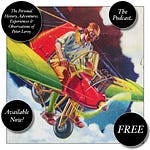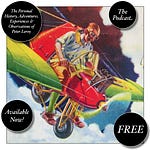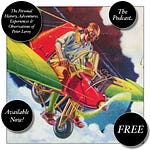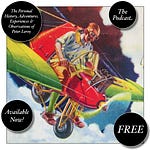IN THE EVENING, I had one drink too many before dinner, and, after dinner, in the lounge, I began the countdown to my fiftieth birthday by reading the first installment of Dead Air. I began by saying, “There are two epigraphs at the start of Dead Air. The first comes from the correspondence of Denis Diderot, but I found it in P. N. Furbank’s biography of Diderot, so I’m going to read it as I found it:
It was [Diderot’s] impression . . . that every tendency was to be found in the heart: noble, base, healthy, perverse, exalted, lustful and homicidal. . . . This, he once told Mme Necker, was the “secret history” of the soul. “It is a dark cavern, inhabited by all sorts of beneficent and maleficent beasts. The wicked man opens the cavern door and lets out only the latter. The man of good will does the opposite.”
The second is from The Two Thousand and Six Month Man by Carl Reiner and Mel Brooks:
INTERVIEWER: Do you remember the national anthem of your cave?
THE 2000-YEAR-OLD MAN: I certainly do. I’ll never forget it. You don’t forget a national anthem in a minute.
INTERVIEWER: Let me hear it, sir.
THE 2000-YEAR-OLD MAN (sings): Let ’em all go to hell . . . except cave seventy-six!
And now, ‘The Daughter of Mr. Yummy,’ episode one of Dead Air.”
ONE NIGHT, late in the spring, thirty-eight years ago, when all of the summer and most of my life lay ahead of me, fertile as a field growing wild, five of us were spending the night in my back yard: Rodney Lodkochnikov, Marvin Jones, Rose O’Grady, Matthew Barber, and me. Rodney was known as Raskol, and Rose called herself Spike. The rest of us used our real names. We were sitting around a fire toasting marshmallows.
We had been talking about the difference between the ideal and the actual — along the lines of “why don’t the insides of the frog they give you in science lab match the drawing in the book?” In the aftermath of that discussion, a silence had fallen. Within it, we toasted the marshmallows and waited for a new topic to suggest itself.
Matthew’s marshmallow burst into flame. He pulled it from the fire and, as he rotated it to char it on all sides, asked, “Can you imagine being someone else?”
“Who?” I asked.
“Nobody in particular. Just not being yourself. Being someone else.”
“Yeah, but who?” asked Spike.
“Anyone,” said Matthew. “Someone who doesn’t exist, but might have existed. Somebody new.” He blew the flame out and began waving the marshmallow in the air.
“Come on,” said Raskol, stirring the fire.
“Okay, okay,” said Matthew. “I mean, what if some other sperm had reached your mother’s egg before the one that did?”
“What are you getting at?” demanded Spike. She clenched her jaw and squinted at Matthew.
“Well,” said Matthew, “what I mean is — ”
Spike interrupted him. “What I mean is, are you suggesting something about my mother?” She leaned toward Matthew. The fire separated them, but even so Matthew pulled away.
“No,” he said. “No, of course not. I mean, I am suggesting that she gave birth to you — ” He paused, smiling, hoping for a laugh, but Spike didn’t even return the smile. “ — and to do that she had to have some sperm — ”
“Do you want a fat lip?” asked Spike.
“No, I do not want a fat lip, thank you.”
“Then stop saying things about my mother.”
“I’m not saying anything about your mother. I mean, except for — ”
Spike leaned closer. The flickering flames lit her from below. “I’ll defend my mother’s good name against all comers,” she said.
“I’m sure you would,” said Matthew.
Spike squinted at him again. “Are you suggesting that it needs defending?” she asked.
“Oh, come on, cut it out,” said Marvin.
Spike grinned and shrugged and said, “Okay, okay. I was only kidding.” She tossed some twigs into the fire so that it flared dramatically, shrugged again, and added, “For all I know, I’m the milkman’s daughter.”
The rest of us thought about this in silence for a moment. Mr. Donati, the milkman in Spike’s part of town, was a short man, heavy, always sweating, with black hair everywhere. Spike looked nothing like him.
I said, “Nah.”
Raskol said, “Not a chance.”
Marvin said, “Highly unlikely.”
Matthew squirmed in place and scratched his ear. When he had something to say he could not allow himself to say nothing, however prudent that might be. Finally, he said, “Mr. Yummy.”
None of the rest of us said a thing. We studied Spike, sidelong, and, trying not to let it show, compared her with Mr. Yummy.
He had been delivering the Yummy Good brand of baked goods in Babbington, where we lived, for as long as any of us could remember. His route took him around Babbington and round and round again, and because he worked at his own pace, no one could predict when he would arrive with his tray of Yummy Good goods. His appearance at the back door, rap-tap-tapping in a jazzy way he had, was always a pleasant surprise. Whenever my mother heard his rapid tapping, she would call out, “Just a minute!” and run into the bathroom to fix her hair and lipstick. His customers called him Mr. McDougal, but their children called him Mr. Yummy. He was ageless, and he was handsome. He had a big smile and freckles, like Spike.
“Now you’re talking!” she said. “Look at these freckles. Look at this smile.”
She smiled her smile, and in the firelight the truth gleamed. Spike was the daughter of Mr. Yummy. There could be no doubt about it.
“I never noticed before,” I said, shyly.
“Maybe you never saw me in the right light,” she said, and that must have been the case, because after that night she became, in my mind, the daughter of Mr. Yummy, and Mr. Yummy became the father of all those things in life that I misunderstood, a role that he still plays.
[to be continued]
Have you missed an episode or two or several?
You can begin reading at the beginning or you can catch up by visiting the archive or consulting the index to the Topical Guide. The Substack serialization of Little Follies begins here; Herb ’n’ Lorna begins here; Reservations Recommended begins here; Where Do You Stop? begins here; What a Piece of Work I Am begins here; At Home with the Glynns begins here; Leaving Small’s Hotel begins here.
You can listen to the episodes on the Personal History podcast. Begin at the beginning or scroll through the episodes to find what you’ve missed. The Substack podcast reading of Little Follies begins here; Herb ’n’ Lorna begins here; Reservations Recommended begins here; Where Do You Stop? begins here; What a Piece of Work I Am begins here; At Home with the Glynns begins here; Leaving Small’s Hotel begins here.
You can listen to “My Mother Takes a Tumble” and “Do Clams Bite?” complete and uninterrupted as audiobooks through YouTube.
You can ensure that you never miss a future issue by getting a free subscription. (You can help support the work by choosing a paid subscription instead.)
At Apple Books you can download free eBooks of Little Follies, Herb ’n’ Lorna, Reservations Recommended, Where Do You Stop?, What a Piece of Work I Am, and At Home with the Glynns.
You’ll find overviews of the entire work in An Introduction to The Personal History, Adventures, Experiences & Observations of Peter Leroy (a pdf document), The Origin Story (here on substack), Between the Lines (a video, here on Substack), and at Encyclopedia.com.














Share this post